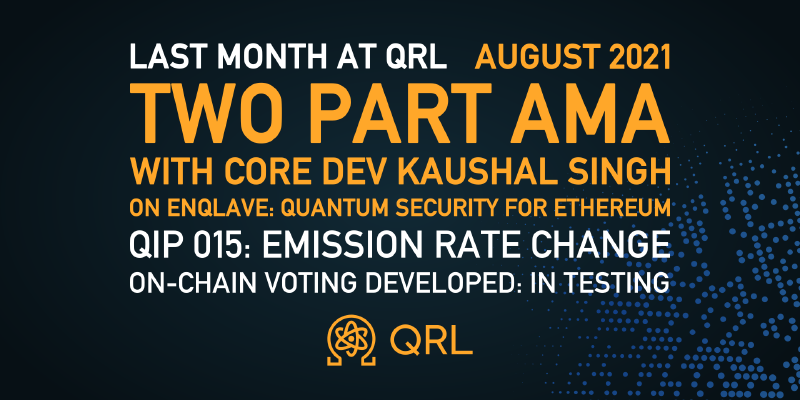Last Month at QRL — August 2021

1st September 2021
Table of Contents
Highlights
Two part AMA with Core Blockchain Developer Kaushal Kumar Singh on EnQlave

Michael Strike and Ryan Malinowski sat down with our core blockchain developer Kaushal Kumar Singh over a two part AMA spanning one and a half hours to talk about EnQlave, which will bring Quantum Security to the Ethereum blockchain, the UAE expansion, and more.
Some notable highlights were:
- What is EnQlave?
- What role does the QRL blockchain play in the enQlave system?
- Directly, where the creation of one eQRT requires the burning of one QRL, creating demand from ETH users who want some level of QC resistance
- UAE Development Hub for QRL
- Is the dev hub going to be made of remote developers or is there a geographic restriction?
Part I: The QRL Show | AMA with Core Blockchain Developer Kaushal on EnQlave: Quantum Security for Ethereum
- 0:00 Intro
- 0:11 QRL Live Show- Intro Trailer on the project
- 2:02 Episode Overview
- 2:42 What role does the QRL blockchain play in the enQlave system?
- 4:21 How does enQlave provide quantum resistance in simple terms? Where are things classically secure vs quantum secure?
- 7:49 Will the QRL Foundation be acting as a liquidity provider 4 eQRL exhanges on Uniswap? How will be structured/executed?
- 9:11 Does enQlave swap quanta on QRL blockchain to eQRT on ETH blockchain? Namely, does enQlave include atomic swaps between QRL and Ethereum? Or does enQlave simply create QR tokens on Ethereum?
- 10:46 How have Ethereum gas - enQlave fees been re-tooled and what will gas costs be for transactions?
- 15:43 Atomic Swaps
- 19:05 Directly, where the creation of one eQRT requires the burning of one QRL, creating demand from ETH users who want some level of QC resistance
- 21:33 UAE Development Hub for QRL
- 23:39 Can you give some metrics on the efficiencies gained by using a L2 rather than on chain ETH?
- 29:21 Is the dev hub going to be made of remote developers or is there a geographic restriction?
- 30:22 enQlave- where are we at now & what is to come?
- 34:17 Closing thoughts
Part II: The QRL Show | AMA with Core Blockchain Developer Kaushal - Quantum Security for Ethereum
- 0:00 Intro
- 0:15 QRL Live Show- Intro Trailer on the project
- 2:04 Episode Overview
- 3:59 Start of AMA - How does enQlave compare to Atomic Swaps?
- 5:06 Can atomic swaps work with the current implementation or is this part of the PoS upgrade?
- 6:27 What is EnQlave?
- 6:44 Atomic Swaps compared to EnQlave- continued
- 14:09 Why the high transaction fees on enQlave?
- 17:49 ETH 2.0, efficiencies- gas transactions higher/lower?
- 20:20 Why cant enQlave be built on the QRL mainnet or some protocol layer of QRL and have QRL start its own version of smart contracts? Wouldn’t this help facilitate QRL transactions quicker, cost less for the user, and give qr storage of smart contracts on a qr mainnet?
- 22:16 How is QRL quantum secure?
- 26:21 How OTS tracking will work with enqlave? Will the user need to track manually the OTS index to have a safe backup/restore process?
- 31:31 Does the goal of eQRT is to provide liquidity to qrl? If yes, do you think the $45 transaction fee will be a problem to create this liquidity?
- 34:03 Has there been any collaboration with or input provided from any of the core ETH developers on enQlave throughout the development process?
- 36:11 What are the technical goals of the planned PoS system? TPS, PoS style, stake requirements, and even a rough timeline?
- 42:05 Why was the name changed to wQRL, instead of eQRL?
- 45:47 Is QRL envisioning a PQ future where vintage ecdsa NFT’s will be wrapped up in EnQlave, cryptopunks, and other NFT art will be marketed/traded as PQ resistant?
- 51:03 Want to give more input on having on-chain NFT support for QRL?
- 52:50 How user friendly will EnQlave be?
- 59:01 Conclusion
QRL Improvement Proposal (QIP) 015: Emission Rate Change Proposal

Currently in draft, QIP 015 suggests an emission rate change to be cut by 90%
The reasoning is that a significant portion of miners currently mining on the QRL network ends up selling their QRL on the network. By reducing the rate of emissions, the overall value of QRL could start to rise, which can result in everything from a higher marketcap ranking to a positive feedback loop.
The draft stage is a great time to get your feedback and will be used to structure the improvement into a proposal that will be voted on.
Have thoughts on the topic? Give your feedback on the QIP directly. Want to hash it out more informally first? We have a thread in our Discord as well.
Development updates
EnQlave
The ContractListener has been refactored to be more fault-tolerant and handle race conditions during chain re-organisations.
API’s were also rewritten to migrate the code from Infura to our own custom Ethereum Node for better stability and handling under a wider variety of network conditions.
Note: We previously were calling wrapped QRL eQRT’s, but in order to reduce confusion, we’re changing that to wQRL going forward, as it functions in a similar way to wBTC. Also explained by Michael Strike in the above video to the AMA question “Why was the name changed to wQRL, instead of eQRL?”.
On-chain voting
In order to properly govern QRL Improvement Proposals (QIPS), as well as for anything else where on-chain governance is desired, we’ve developed and will be releasing on-chain voting.
It works by first taking a snapshot of the blockchain at a certain blockheight and then creating and distributing a token in a 1 to 1 proportion to the funds in the QRL wallet. There is then two or more addresses that represent the voting outcomes where people can send their funds to.
Further testing, documentation and supported tooling is still left to be worked on before a wider release.
QRL Improvement Proposoal Refresh
The QRL Improvement Proposals (QIPs) is the formal process to change things related to the QRL core protocol along with other layers that effects most or all QRL technical implementations.
It covers the following layers
- core: Improvements requiring a consensus fork.
- networking: Improvements around network components
- security: Improvements and upgrades to to the security
- Interface: Improvements around APIs
- Meta: QIP Process, governance, structure
It’s influenced from Ethereum Improvement Proposals (EIPs) and Bitcoin Improvement Proposals (BIPs) in its scope. This has worked, but through observing people going through the process we identified a few key areas missing.
The QRL Improvment Proposal (QIP) refresh is designed to address those issues and more through:
- Adding more clarity through specifying a workflow, template, and specification documents. Locally it’s possible to preview the QIP on your localmachine through jekyll.
- Adding more programmability parsability through front-matter with correct syntax.
- Improve governance by including a process for on-chain voting to take place.
Right now this is complete but will be going through review and further discussions before a PR is issued.
For proposals that don’t effect most or all of QRL technical implementations, such as client implementations (eg. wallets, explorers), as well as non-technical related proposals (design, advocacy), but where consensus is required, there is a QRL Enhancement Program (QEP) being developed as well.
Other updates
- qrl-wallet: QRL Wallet v1.7.2 with better support node v2.1.2: In testing
- electrify-qrl: Bring electrify-qrl GH repo up to date with code released on npmjs
- documentation: Implemented initial documentation refresh in docusaurus
- websites: Resolved 269 hrefs issues over four domains
Advances in quantum computing
Google’s time crystal discovery is so big, we can’t fully comprehend it
“Forget Google Search and Fuchsia. Researchers from Google, Stanford, Princeton, and other universities might have made a computer discovery so big we can’t fully comprehend it yet […] But if it turns out to be accurate, then Google might be one of the first companies to give the world a crucial technological advancement for the future. Time crystals will be an essential building block in quantum computers, the kind of computers that can solve complex problems with incredible speed and power technologies that aren’t even invented.” - bgr
Quantum computing: New breakthrough could set the stage for massive speed boost
“Researchers in Japan have made a discovery that could unlock opportunities to combine classical and quantum computing technologies in new ways, resulting in a massive boost in processing power.” - techrader
A complete platform for quantum computing
“In a new groundbreaking work, researchers from DTU have now realized the complete platform for an optical quantum computer. The platform is universal and scalable, it all takes place at room temperature, and the technology is directly compatible with standard fiber optic networks. This puts DTU right at the forefront of the development.” - phys.org
Progress in algorithms makes small, noisy quantum computers viable
“Current noisy, intermediate scale quantum computers have between 50 and 100 qubits, lose their “quantumness” quickly, and lack error correction, which requires more qubits.” … “We found we could turn all the problems of interest into optimization problems, potentially with quantum advantage, meaning the quantum computer beats a classical computer at the task” - phys.org
Researchers Create Scalable Quantum Chip That Works At Room Temperature
“UNSW Sydney’s quantum engineers have removed the major obstacles that have hindered the realization of quantum computers. They have discovered a new technology that they say can control millions of spin qubits” … “The team then plans to use this new technology to simplify the design of short-term silicon quantum processors.” - illinoisnewstoday
Want to learn more?
Give our website theqrl.org a browse or join us for a chat in one of our many communities on Telegram, Discord, Reddit, Facebook, or KakaoTalk.
Want to stay up to date? Follow us on Youtube, Twitter or our Telegram news channel.
Want to dig into our audited, MIT open-source, enterprise-grade codebase? Check out our github at: https://github.com/theQRL/QRL/
1st September 2021
